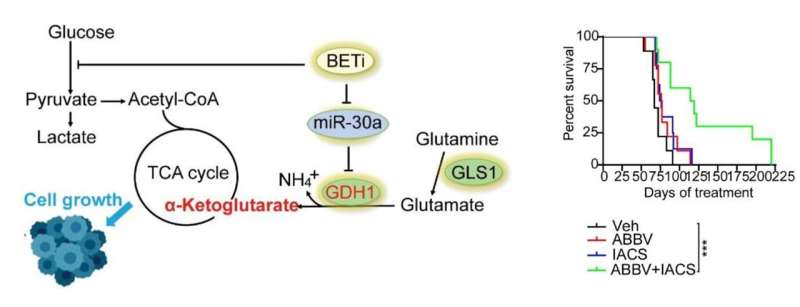This article has been reviewed according to Science X's editorial process and policies. Editors have highlighted the following attributes while ensuring the content's credibility:
fact-checked
proofread
Study finds targeting BET and OXPHOS causes synthetic lethality in liver cancer

Primary hepatocellular carcinoma (HCC), the major type of liver cancer, is a leading cause of worldwide cancer-related death. End-stage liver cancer patients have limited treatment options due to the lack of druggable targets, and the treatment outcome is usually complicated by the heterogeneous tumor microenvironment.
One hallmark of cancer is deregulated metabolism, which contributes to tumor progression, metastasis, and relapse through cancer cell intrinsic metabolic remodeling and metabolic interactions within the tumor microenvironment. HCC develops from transformed hepatocytes with features of metabolic remodeling.
While previous studies have identified different metabolic enzymes and pathways modulating liver tumor initiation and progression, how liver cancer cells undergo metabolic adaptations in response to specific drug treatment has not been fully explored.
Bromodomain and extra-terminal domain (BET) family proteins are a class of epigenetic regulatory proteins that recognize and bind acetylated histones to regulate the expression of oncogenes such as MYC. The pan-BET inhibitor (BETi) JQ-1 reduces liver fibrosis, or non-alcoholic steatohepatitis (NASH)-associated liver tumor progression.
Although different classes of pan-BETis are now in clinical trials, the efficacy of BET inhibition as monotherapy is limited, making it necessary to develop combination therapies with other anticancer agents. How BET inhibition induces MYC-dependent or independent metabolic adaptations in cancer cells remains unclear.
In recent work published in Life Metabolism, researchers have found that even transient BET inhibition by JQ-1 and other pan-BETis blunts liver cancer cell proliferation and tumor growth. BET inhibition decreases glycolytic gene expression but enhances mitochondrial glucose and glutamine oxidative metabolism revealed by metabolomics and isotope labeling analysis.
Specifically, BET inhibition downregulates miR-30a to upregulate glutamate dehydrogenase 1 (GDH1) independent of MYC, which produces a-ketoglutarate for mitochondrial oxidative phosphorylation (OXPHOS). Targeting GDH1 or OXPHOS is synthetic and lethal to BET inhibition, and combined BET and OXPHOS inhibition therapeutically prevents liver tumor growth in vitro and in vivo.
Together, this study uncovers an important epigenetic-metabolic crosstalk whereby BET inhibition induces MYC-independent and GDH1-dependent glutamine metabolic remodeling that can be exploited for innovative combination therapy of liver cancer.
Notably, BETi/OXPHOSi combination therapy is more effective for BETi-responsive liver cancer cells. These findings also suggest that targeting induced metabolic dependency upstream of OXPHOS, such as glutamate by glutaminase 1 (GLS1) or GDH1, can also induce "synthetic lethality" in BETi-responsive liver cancer.
As a new generation of BETis is emerging, such as BRD4 PROTAC (ARV-825), together with the suitability of GLS1 and GDH1 as drug targets, one can anticipate that targeting BET proteins and GLS1-GDH1 metabolic axis may hold therapeutic potential, which is worth being fully evaluated in the future.
More information: Wen Mi et al, BET inhibition induces GDH1-dependent glutamine metabolic remodeling and vulnerability in liver cancer, Life Metabolism (2024). DOI: 10.1093/lifemeta/loae016



















